
There are hundreds of ways to get to the point when you have a list of keywords to target in search engine optimization. And then sort them by the search volume and keyword difficulty metric as many SEOs (including me) like to do that. Let’s assume that you have it already for a second, shall we?
If an SEO specialist did a good job, those keywords will be high search volume, drive visibility, traffic, and eventually, will allow to monetize the website.
Unfortunately, in most cases this doesn't happen or it takes much longer than expected. Usually, there's a reason for that.
There is one step that too often is overlooked: evaluating particular seo keyword difficulty metric based on something more than a single metric served by various SEO tools out there.
I get it: it's convenient to see the number like domain authority or keyword difficulty scores be 26, 90, or 66 and already have a feeling like you've done the work and you know. Those numbers are indeed helpful and they are a great first filter to estimate our chances for the top ten.
However, if you'll choose to spare additional time on analyzing your target phrases, you may save yourself hours of frustration. Not to mention all the money you'd spend on content that will not bring the results you expected.
That's the thing: the best site architecture and a perfect silo won’t stick when you aim too high for the domain capabilities. Today you will learn how to set achievable goals and deal with keywords that are out of your reach. At least for now!
Evaluating keyword difficulty score based on first page of organic search results
Domains are called "strong" thanks to two main factors: their backlinks profile and overall visibility in search results. Those strong domains and their high authority pages are your worst enemies when you compete for a particular keyword when the keyword difficulty metric is high.
When you have backlinks and rank high in thousands of SERPs, Google likes you more. It will even give some slack for difficult keywords and rank not-so-well-optimized content. Small website owners very often pour their hearts and souls into content that overall delivers better value. But they may never get to the top ten anyway.
Secondly, high authority pages' brand can steal clicks in a SERP. Because we're constantly exposed to some big names, human brains may steer our click to Amazon rather than some unknown small e-commerce store. Or Business Insider article rather than a blog post from some unfamiliar domain—even if it ranks higher!
It's best for us if we don't have to compete with those high-authority websites.
An easy way to recognize them in SERP, is to check their traffic among the other ranking pages. You can use Surfer's SERP Analyzer for this or Keyword Surfer free extension (it provides data for the top 10). If you see a spike like this, you have identified a high authority page. The more spikes, the higher keyword difficulty is.
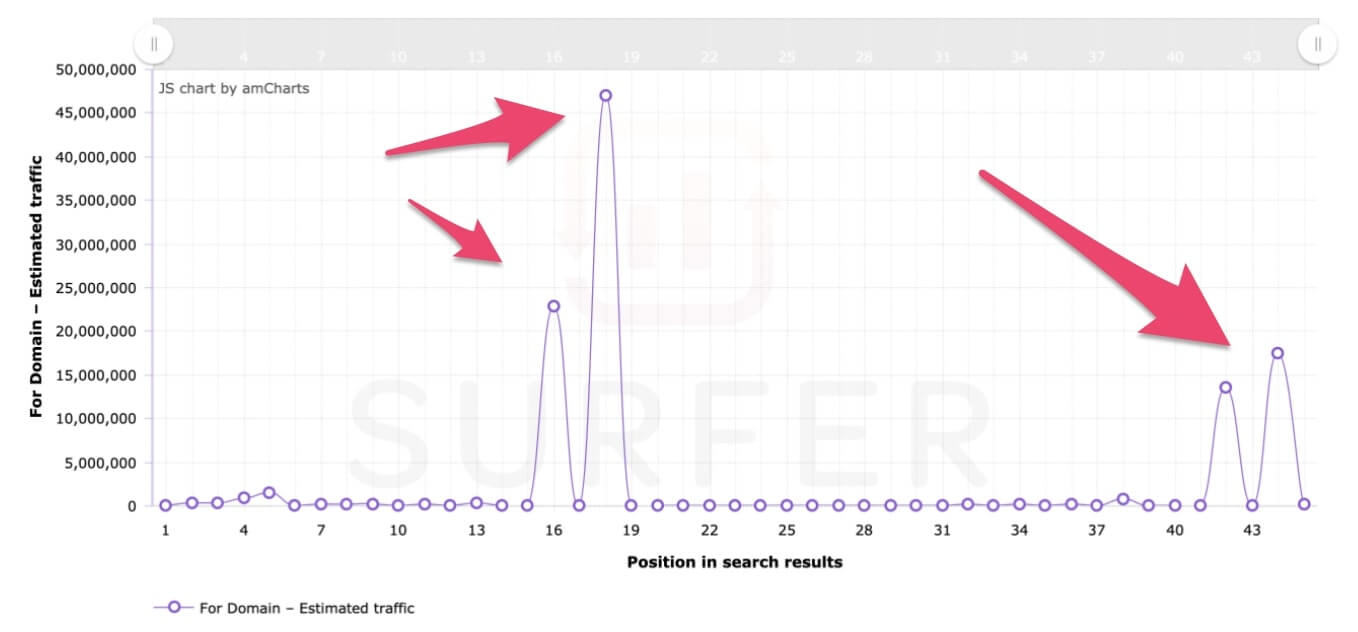
The more pages with high authority in the top ten, the fewer competitors you can probably outrank. It makes the SERP harder to take over.
There will always be one or two strong domain ranking for your phrase. The problem is when there are mostly or exclusively those domains with high number of referring domains.
How to compare yourself with the pages in SERP?
There's no point in going to granular here so don't try to be too meticulous. Check the order of magnitude and see if you are on the same level. Page with ten thousands of organic visitors can’t easily outrank one with millions.
SERPs often have results split into two buckets—smaller niche relevant pages and high authority sites.
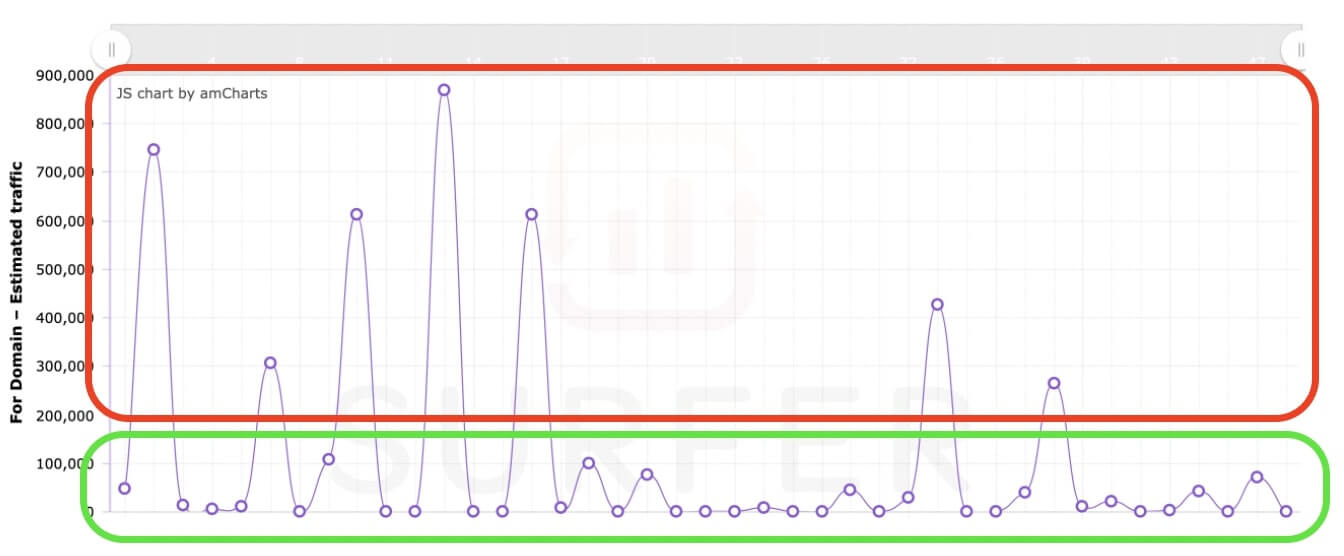
The 5:5 ratio in the top ten (pages you can outrank vs high authority pages) is a dead center. You shouldn’t bother too much with keywords that have 6 and more high authority pages in SERP. The keyword difficulty score will be too high.
Pages I can outrank—the new metric for researching keyword difficulty metric
Use the ratio mentioned above to prioritize keywords on your to-do list. There is no point in starting with a term that has 9 results in the top 10 that are too strong for your domain.
Add a new column to your keyword research sheet that will contain this information.
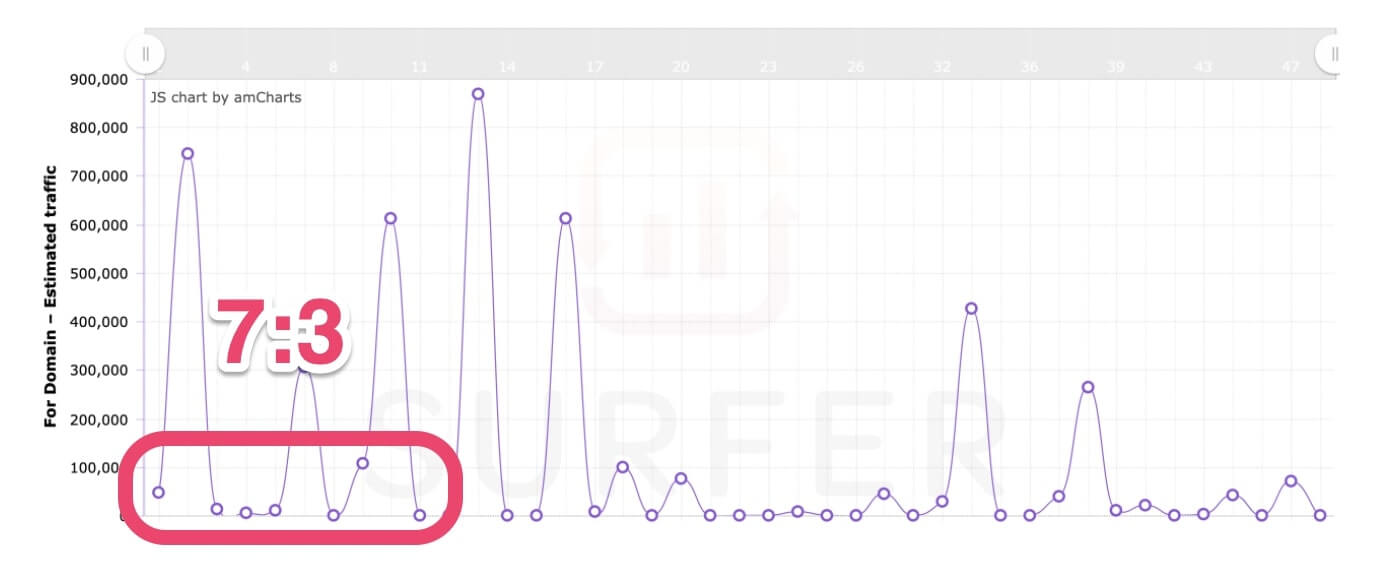
Tactics for when you're strong enough to compete for difficult keyword
For search terms that you can tackle right away, the recipe is very simple. Write optimized content in the SEO Content Editor and link the new article internally from relevant and already ranking posts. Here's a comprehensive guide on how to write with Surfer.
Anyway, nothing fancy here. With some work you can nail those keywords.
Let’s move on to the point of this article, that is...
What should I do when my page is too weak (keyword difficulty score is too high) even if compared to the niche sites bucket?
Building credibility for the domain to beat high keyword difficulty metric
As usual, we have two ways of building credibility for the domain. You can agree for a long-term strategy—that is growing your content consistently on less popular keywords that will build topical relevance for the whole domain. Easy, right? :)
There is a shortcut to high credibility and, of course, it is called link building. Put some content on the website and start building links to get noticed.
Both strategies work well but the real magic happens when there is the synergy between link building and creating high quality page content.
Let’s start with the backlinks building strategy for credibility growth.
Quality backlinks building
Which backlink is stronger for the “best protein powder” keyword—the one from Forbes? Or a much smaller, but relevant page that ranks well in the niche?
Well, this question originally comes from Matt Diggity and his answer is:
The strongest backlink you can get for “best protein powder” page is from the page that ranks #1 for “best protein powder”. Google’s already decided it the most relevant and authoritative URL in the world for target keyword.
I believe it's easier to write a guest post or get a link in any other way from a niche website than Forbes. So that's good news!
Writing a guest post for this top ranking domain is basically "renting" the first spot. Now THAT'S a nice perspective!
My go-to strategy for target keywords I can’t tackle at the moment
- Find a relevant website that you can possibly post your content on.
- Make sure it is eligible to rank for the keyword (the high authority:low authority pages ratio works at your advantage).
- Create a top-optimized content that not only links to you but smuggles a CTA for whatever your page offers as well.
This way you can have your content in the top ten without strong domain and eventually have two results in the top—your grown-up domain and the guest post itself. Bonus—no one else will be able to acquire that link.
Optimize pages that link to you
The beauty of on-page SEO is your full control. When it comes to the guest posting you won’t be able to influence the architecture and do technical improvements; but you can and you should optimize the article.
Don’t waste money on posting just for the link. You want your guest post to be read. Otherwise, it's a lost opportunity for much stronger backlink and potential (yeah chances are low but still) traffic.
Imagine this:
A plumber writes for the local news website about fixing leaking tap by yourself. Some may think that he will lose the leads because people will fix it by themselves. Well, when someone is motivated to do the repair, he will find the information anyway. Imagine someone just checking if it is an easy task and finds a comprehensive article showing that it requires a wrench that he does not have. What else does he find there? Contact to the professional nearby who can do the job. The plumber already proved his skills with sharing knowledge. So now he's a trustworthy contractor and more likely gets a new client.
If that was a link built by the cheap agency, he would probably end up with a 300 words article about dripping tap that barely got indexed.
Action plan
- Make sure that the content is not a shallow blurb with a backlink and it provides a value to a reader.
- Optimize the article with data from other well-ranking pages.
- Review the site that you will post on and find related articles that could potentially link to you internally. It will strengthen the article and speed up indexing.
- Think of throwing some links at the article—even a bunch of no-follows can help.
Outreach link building
Manual outreach seems to be not working in 99% of cases when people try to do it (yes, I made up this number but you get the point). Why is that? Well, they make the same mistake with a boring pitch that is basically trashed right away.
There is one simple trick that can raise your chances with the outreach link building that Matt Diggity shared recently [LINK BUILDERS HATE HIM].
Is a unique, 1k words long content a real value proposition?

No, it is worthless. You can find people who charge $20 for that.
That's the kind of pitch that will rarely get a positive response.
As an article provider, you have to offer something more to your publisher. Something that positions you as that guy or girl who knows the business. You can add "SEO-optimized" to a set of adjectives inside your pitch but... Can you win this blog spot with empty buzzwords?
Here's another idea: make your pitch data-driven!
Do a content gap analysis in Ahrefs with the weakest competitors. That way, you will get a set of keywords that they rank for and you're not. It shows off your professional approach and gives your pitch a nice hook.
This page is much smaller than you and ranks for it, I can help you take them over with my article!
According to Matt, proposing a topic based on competitors’ research and backing it up with a case study from previous publications, increased response rate and conversion.
Show that you can drive additional traffic and support yourself with data to convince the site owner. Matt raised the outreach conversion rate by 64% after introducing this method. Be like Matt. Read the full case study here.
Give it a shot, especially these days when we are all tight on the budget.
Paid links
Yet another shortcut in the article. No time for outreach? Want the links right away?
Well, I asked Gary Wilson, GetMeLinks.com Founder about the prices and possibility to get some internal links pointing to the guest content as well.
Gary, please tell me what is the entry price for a guest post that has chances to rank for a low, medium and high competitive keywords? I will provide the top optimized content, semantically correct, comprehensive article without the content gap.
Gary: At Get Me Links, we actually provide articles as part of our Guest Post link pricing, but of course we can take this off the top if you would like to provide your own articles which might be better suited to rank for specific keywords that you are trying to target on the Guest Post end too. It’s hard to say exactly what level of the link you’d need to buy - it would be great if you could clarify what you mean by low, medium and high competition keywords?
By the low competitive keywords, I can imagine detailed People Also Ask questions answered or local services in a small city. Let’s estimate the minimum traffic value at 1k/mo. Basically sites with organic traffic.
Gary: For most easy local niches, I’d recommend DR 30+ Guest Posts, they’re the lowest end that we offer but actually very similar to the top tier links of other services. All of these sites are 1,000+ Ahrefs est site traffic by minimum starting at $160 including content, but we can also do a 5,000+ traffic guarantee for a total of $220. I’ve seen many of these ranks for long tails and I’ve seen many local websites rank off the back of them over the last couple of years.
The medium ones - topics targeted by e-commerce or SaaS blogs or nationwide niche definitions and guides. Domain should have at least 100k/mo of organic traffic.
Gary: For these types of sites, I’d recommend DR 45+ or DR 60+ links. DR 60+ for extremely competitive terms as we actually offer a 10,000+ traffic guarantee (this being our top tier guest post offering). These come in at $430 a link, but they’re unparalleled to anything that you’ll see with most guest post services as a bulk level guarantee. For many medium level e-commerce niches, a lot of our clients get on well with DR 45+ links too which come in at just $260 per link.
High competitive keywords where niche sites are barely visible - minimum traffic value here is 1kk/mo.
Gary: Dependant on the project, I’d again recommend DR 45+ and 60+ links for these kinds of sites coming in at the prices previously mentioned. However, some huge websites may want to do their own PR to achieve publication links which are the next level of links that you can build (Examples being: Forbes, Huffington Post, NY Times etc…) This isn’t something that we offer as it requires a lot of creative PR work to land those types of links. If you’re paying vendors for them, prices can range from $500-$10,000 per link!
Any chances of getting the guest post internally linked from articles of my choice using specific anchor text? ;)
Gary: This isn’t something that we currently offer but I have been successfully achieving this through doing outreach for many of my own projects and I’m hoping to introduce it within the service at an affordable rate in the future.
Now you know how much does it cost to get on the domain that has chances to rank for the chosen keyword. Is it worth it? For sure, especially when you publish top optimized content and share your message on more than one result in the top 10.
Internal link building is crucial to tackle high keyword difficulty search terms
Growing your content is essential to build topical relevance, but throwing articles blindly may not help as much as it could. Build relevancy in a specific direction. The most beneficial internal links come from related topics.
Here is a real-life example of what happens when you go outside your niche from Slawek Czajkowski:
Digital marketing agency that I partnered with decided to create a massive amount of content about television ads. They built many articles out of their main topic—SEO, Ads and Building Websites. Google threw them away from SERPs (Search Engine Results Page). Make sure to stay within your niche... unless you are Forbes or Medium.
Only supportive articles that rank for the same niche keywords will build you proper credibility. Plan a simple silo for the money page that is not ready to rank for the main keyword. Link internally using consistent anchors structure and that will be the best way to get closer to the main focus keyword that has monstrous difficulty.
Internal Linking Complete Guide 2022?
You can have the best content on your page but bad internal linking can ruin your work. There is only one word that describes how to deal with internal linking—consistency.
Make sure that anchors pointing to the page are selected from it’s ranked keywords and just them. Don’t overlap anchors among the pages. Be consistent. Each page has dedicated keywords. These keywords are the anchors.
THE END.
But seriously, internal linking is so important and worth your time...
I hope to prepare more detailed guide on that including types of internal linking structures like wheel, silo, flat structure and other, however a foundation for each technique is consistency in anchors.
If you want to dig deeper into this topic, Steve Toth shared super cool tip on this topic in his newsletter—seonotebook.com. He shares tons of good SEO stuff there, and one of his pieces fits this here: Boost your money page with internal links from power pages that you didn’t know you have.
Finding subtopics in Google
You can start with a very basic technique - search your keyword in Google and check People Also Ask questions. You will find great topics for small, supportive articles. It will be much easier to rank those low-volume keywords., At the same time they will be supporting your money pages if they rank well on related topics.
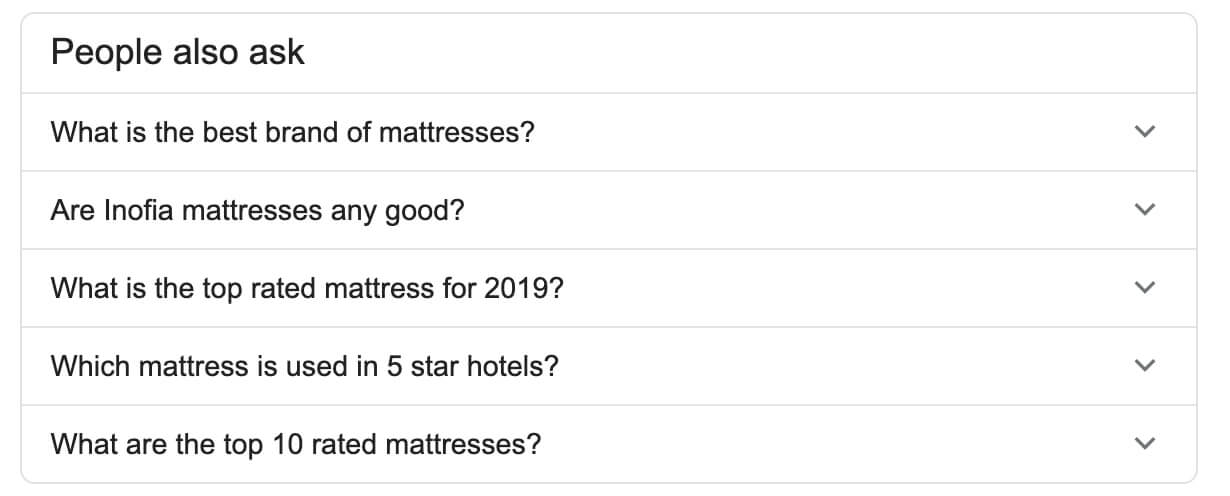
You can spend time on Google a bit more effectively using a free chrome extension for keyword research—Keyword Surfer. It reveals search volume, shows similar keywords that you can use to create subtopics and gives an overview of the ranking pages strength.
Keyword research in Surfer
Here are two quick ideas on how to extract topics for supportive pages.
Start with your money keyword and scroll down to smaller SERP (Search Engine Results Page) similarity you can start below 25%. I just found a golden nugget—niche topic for the very competitive keyword that clearly can be my supportive page:

This time I used a single word from the main focus keyword—mattress, and checked “having same terms”.
Scrolled down to the lower search volume keywords and in 5 minutes I build a clipboard of low competitive search terms that are great ideas for standalone articles supporting my main money page—“mattresses review”.
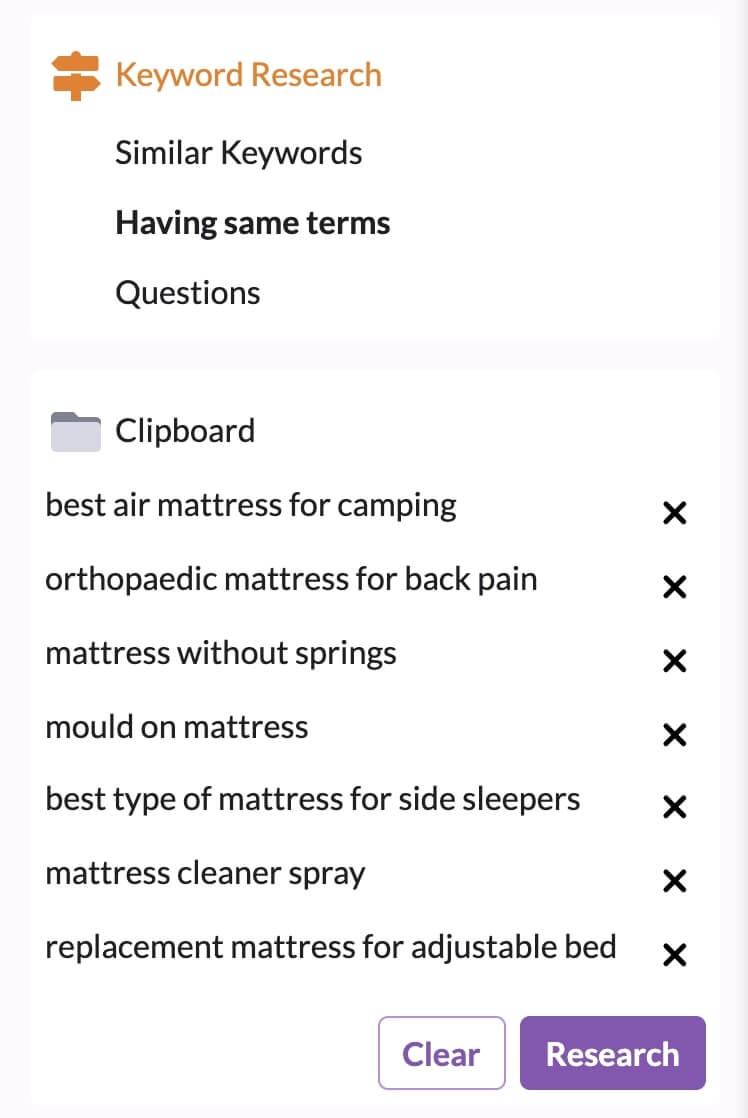
These two ways of creating supportive pages ideas are effective...
...but what if I told you that it can be automated and based on currently ranking pages’ structure? So you don't have to do all the manual work but just give your target phrase and poof!
That would be a big time saver for SEOs and website owners out there, right?
Well, our team is working on this exact feature that will be available very very soon inside our product. Here's a little teaser of what we're testing at Surfer (virtual) Headquarter.
200 clusters based on competitors in a few minutes, watch and get ready!
Takeaways from the keyword difficulty guide
If you think seriously about building credibility and links, the synergy between on-page and off-page is critical. Write for domains that are capable to rank and link to your site, It is not only quality backlinks acquisition but taking over a big chunk of the SERP (Search Engine Results Page) with content that has your message. In the long term, you end up with your page and the guest articles in the top ten.
Before you try rank for any high keyword difficulty search phrase:
- Evaluate Keyword Difficulty score with pages you can outrank ratio
- Build backlinks on pages that have chances to rank and be evergreen
- Constantly grow a topical relevancy for the domain on smaller supportive keywords, start with low keyword difficulty phrases
Growing up domains this way creates niche authority pages. Start today and take over these high keyword difficulty phrases!
Further reading
- Keyword Research Ultimate Guide: Step-by-Step Strategies for more traffic
- What are Keywords? How do you use them for SEO?
- The Great Search Intent Analysis of 2020: Top SEOs on User Intent + Big Data Case Study on Intent Changes

